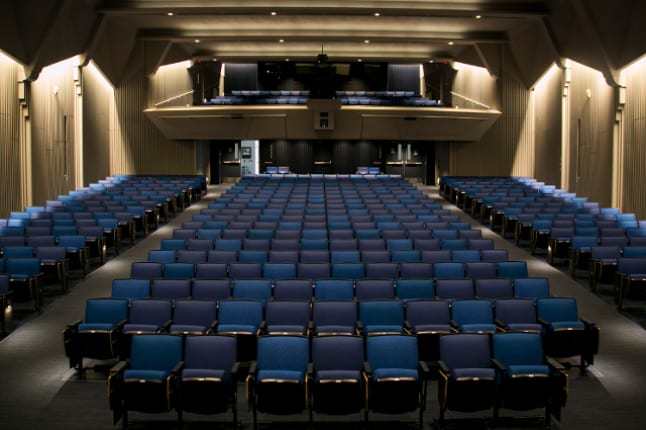
Douglas Scholz-Carloson looks at the people stacked up in boxes on his computer screen like an episode of “Hollywood Squares.”
“Welcome, everyone, to ‘The Seductive Countess,’” Scholz-Carlson says before explaining to all of the virtual spectators how to put their screens into gallery mode and turn off their cameras, but encourages them to keep their mics on so their laughter can be heard.
Scholz-Carlson, 53, is a University of Minnesota school of theater arts and dance professor. His students have to satisfy performance credits to graduate, and due to COVID-19 that’s complicated. Large gatherings have been banned, theaters have shuttered and learning has gone online. But Scholz-Carlson decided to experiment.
“The Seductive Countess” was one of four Moliere one-act plays that Scholz-Carlson and his student-actors recreated as “Zoom theater.” They rewrote parts of the script, modernizing jokes and changing dialogue to make the characters aware that they were in a Zoom meeting.
Jordan Reising, a 20-year-old junior in the Guthrie Theater B.F.A. Actor Training Program, plays the title character in “The Seductive Countess.” Her red hair and boisterous personality explode onto the screen, eliciting roars of laughter. She and her co-stars pop in and out of the meeting instead of “entering” or “exiting” a stage and “pass” props through their Zoom windows.
Reising conducted every rehearsal and performed every show from the confines of her apartment bedroom. She says it must’ve been strange for her roommates to hear her screaming for hours each night.
“It was initially the most frustrating process because of the nature of these plays. They’re so physical. I think a fair amount of physical comedy translated, but trying to do a very physical, stylized play in your bedroom is weird,” Reising says. “But also in a good way, I never left the work. I was living in the room. So, I was never not thinking about it.”
Yet Reising is still skeptical of getting an acting degree online. She says that acting requires an empathy and human connection that isn’t attainable that way.
Scholz-Carlson shares Reising’s sentiments. Many are asking what will become of live theater, and some think “livestream” performances may be the future. Though Scholz-Carlson spearheaded the Zoom play initiative at UMN, he disagrees. He says that though virtual theater may open up some interesting new avenues, nothing will ever beat live theater. He thinks audiences will return once bans are lifted and theaters begin to open again.
“Lots of people are expressing that sort of real need for community,” Scholz-Carlson says. “So, it could be that people are so hungry for it that they will rush back into the theater. We just don’t know.”
********
Sam Marzella stands in his sweltering hot garage, posing in front of his laptop. He’s clutching the side of a wobbly keyboard stand as he moves into position. He’s tall, so the stand is perched on a case of water bottles in order to reach his waist.
Marzella is a 19-year-old musical theater major at Carnegie Mellon whose schooling has moved online due to the pandemic. Originally from Orlando, Florida, he’s continuing his freshman year from home. But finding a place to do ballet three days a week on Zoom is only one of the challenges Marzella— and many others like him— are facing.
“Right now, the biggest problem for me is focusing,” Marzella says. “When someone’s giving notes or trying to explain things, and you’re staring at a screen watching them, it’s different than being there and absorbing the information.”
Shannon Rose McCann, a 26-year-old junior at Five Towns College in Long Island, New York, is also a musical theater major.
Back in March, McCann was supposed to be in a stage production called “The Wolves,” but COVID-19 interfered.
First, one of the lead actresses went to Russia for a family celebration and was detained due to the virus. With a week until the premiere, the crew had to hurriedly find a replacement. A young woman named Debrina Santerelli stepped in and learned all of the lines in a flash. But on opening night, the cast was informed that this would be their only show. After everything they’d been through, the virus ended the run.
Now, McCann is cooped up inside, hiding from her family and rambunctious puppy, Indie, so that she can record herself reciting dramatic monologues into her phone camera.
“The professor is having us act for film, in a way,” McCann says about her acting class. “He’s teaching us how to make these clips for our portfolio now, and at the same time, still applying the same lessons as you would normally get in acting.”
********
According to Sheriden Thomas, teaching comedic timing is nearly impossible through a computer screen.
Thomas, a teacher of acting and directing at Tufts University, is 70 years old and never had to teach online before COVID-19. She had to adjust to tools like Zoom to conduct her comedic Shakespeare class, and lagging WiFi made a mess of the course.
Remote learning hasn’t been any easier for teachers. But Thomas does concede it’s forced her to overcome a lot of her resistance to, and preconceived notions of, technological possibilities.
“I’m about to retire, but if I were working another five years after this, I would start understanding how to work with Canvas, which is what Tufts uses,” Thomas says. “I would learn more about on-camera work and stuff, and I would just get boned up on technology in regards to acting.”
This is exactly what Five Towns College Acting professor David Krasner is trying to do. Krasner also isn’t accustomed to incorporating technology into his lessons. He said that he’s 68 and in his 42 years of teaching he’s “never seen a situation like this before.”
Krasner hasn’t engineered a “made for Zoom” play, but he does use Zoom to meet with his students and coach them through monologues and scene pieces. He says he takes his laptop into his basement to avoid his family and needy dogs, Benji and Ollie. This often interferes with his connection and causes difficulties.
Krasner also directs the senior showcase— which was canceled. Graduating seniors use the showcase as a way to “audition” for agents who are invited to come and watch. Each student delivers a series of seven carefully crafted monologues. Krasner decided to have his students record their monologues instead.
“Tapes for auditions is an essential skill,” Krasner says. He wants to send the videos to the agents who were meant to attend the showcase, and even some who weren’t. He watches them first and provides feedback.
“Will you watch mine again?” One of Krasner’s seniors asks via Zoom class.
“I’ll watch it ten times,” Krasner says. “I’m doing laundry right now, and that’s the highlight of my day.”
Still, Krasner said online learning has mostly cons. As much as they, and so many others, are making the best of a bad situation, he knows that it’s never as good as the live performance.
“The word theater comes from the Greek, and it means a place to see and a place to analyze,” Krasner says. “If we don’t go to the theater to see a play, then it’s not the same anymore.”
This article was produced in collaboration with the Boston Institute for Nonprofit Journalism as part of its Pandemic Democracy Project.
HELP DIGBOSTON WEATHER THIS STORM AND CONTINUE PROVIDING ARTICLES LIKE THIS ONE
Kendall Tamer is a graduate student in journalism at Boston University.

